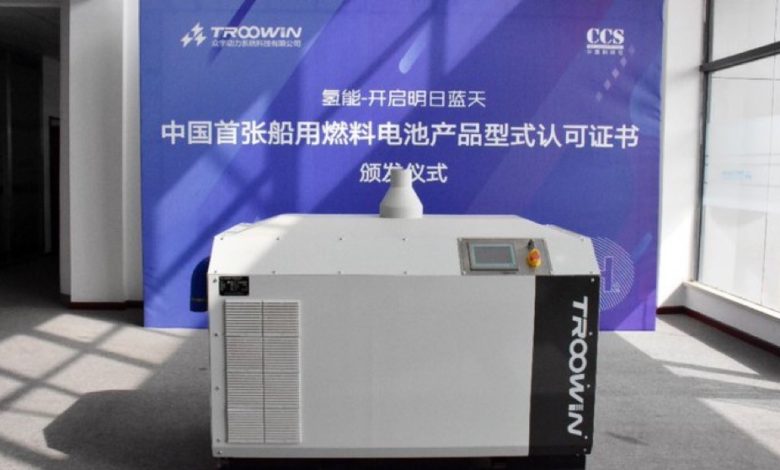China’s first marine fuel cell celebrates type approval

China Classification Society (CCS) has awarded China’s first certificate of type approval for a marine fuel cell product to Wuhan-based PEM fuel cell supplier Troowin Power System Technology.
The certificate was issued by CCS’ Wuhan branch following more than a year of reviews and on-site tests. The approval marks a major milestone in China’s pursuit of commercially viable alternative fuels and provides a new channel for the use of hydrogen fuel cells on ships.
“CCS is working hard to develop the use of hydrogen fuel cells,” said Jia Siqing, general manager at CCS’s Wuhan branch. “Hydrogen is abundant and is an ideal candidate as a zero-emission fuel for combustion engines.”
Hydrogen is clearly the future and is a very hot topic in China
Jia said the next phase of hydrogen development will see CCS undertake a series of real time tests on a purpose-built 2,100 dwt bulk carrier. The ship is currently at the design stage but is expected to be powered by four 130kW hydrogen fuel cells. Once completed, the ship will be trialled along the Pearl River in Guangdong province, where it will carry operational cargoes. Reinforcing the data from these tests will be feedback from other sectors, such as the Chinese electric automotive sector.
Jia said a major challenge CCS is looking to tackle during the tests is storing enough hydrogen to take a ship on a deepsea voyage. He said CCS is researching ways to store hydrogen in large quantities and combine it with other fuel sources to extend range.
“Since hydrogen is the lightest natural element, more space is needed to store it,” he said. “We are looking at methods to create hydrogen at sea, such as the use of methanol or ammonia, which can be transported easily and cheaply. But the main focus of our work is carrying enough bulk hydrogen, for an entire voyage. We think liquid hydrogen would be a good contender for this. In the meantime high-pressure gas cylinders would be a reasonable solution.”
Meanwhile, Luo Xiaofeng, the director of the CSS Rules & Research Institute in Wuhan, said a prime objective of the Pearl River tests would be to test safety procedures.
“Hydrogen is clearly the future and is a very hot topic in China,” he said. “CCS is working with other other hydrogen-use sectors and universities to share the research notably the automotive industry. Breakthroughs elsewhere can help the marine industry. Safety is absolutely key to developing a commercial case. These are the prime factors we will be testing on the Pearl River project.”
Luo said in the short-term, for deepsea voyages, low-carbon and hybrid systems are better forms of propulsion.
“We favour new hydrogen systems being installed on brand new ships rather than trying to retrofit the existing fleet,” he said. “This is primarily for safety, as this can be optimised in the design.”
In addition to conducting research on various forms of marine hydrogen fuel storage technology, CCS has also jointly carried out special research on the application of hydrogen fuel on ships with China State Shipbuilding Corporation (CSSC). The research included risk assessment, ventilation and fire-fighting. The studies evaluated the feasibility, reliability and safety of hydrogen fuelled ships and provided support for the development of technical regulations.
CCS is further now authorised by the China Maritime Safety Administration to research and develop the first domestic technical regulations for ships using hydrogen fuel, which will be released at end of 2021.
